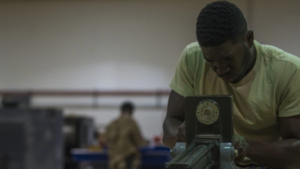
Professions and Motivations in Reality Shows
Have you ever noticed that whenever a person is introduced on a reality TV show that their profession is included on the label with their name? This is true of both classic talk shows where people could be coming on to talk about a completely unrelated personal topic and of shows like Big Brother, Survivor, The Biggest Loser, etc.
Stop to think about the implication of that labeling choice. The profession is included up on the screen with the person’s name, indicating that it is part of their identification. Producers believe that it is a large part of the first impressions we make with people on reality TV and that we even use it as a measure of integrity. Their profession, the show tells us, is central to who they are.
Does knowing a person’s profession really tell you something about who they are? Does it truly reveal character or point to trustworthiness? Does it actually help you understand their motivations and actions?
In order to understand why show creators are labeling people in this way and what it says about how we should think about our own professions and identities, it’s helpful to understand why people watch reality TV in the first place.
Reality TV’s Appeal
Because of reality TV’s meteoric rise to fame, there have been several studies conducted to determine what it is that makes these shows appealing to viewers. While stereotypes abound that reality TV fans are less intelligent or have more spare time on their hands, neither of those claims holds up. What does separate fans from non-fans, though, is their view on status and prestige.
As a Psychology Today survey of over 200 people revealed, reality TV fans tend to put more importance on achieving a high status. Fans are much more likely to seek prestige, and they like to watch these shows because it is inspiring to see someone “ordinary” (like them) get access to instant fame and importance.
This observation is connected to a study published in the Journal of Media Psychology. This study dispelled the theory that people watch these shows because they like to see others humiliated. In fact, many viewers saw the characters in a positive light and wanted to see their own friends and loved ones participate, which indicates that their attraction is rooted in empathy rather than cruelty.
The Importance of Profession To First Impressions and Integrity
Let’s go back to those profession labels under a participant’s name with this understanding of what motivates viewers in mind.
The audience is being introduced to a character that they’re supposed to feel connected to—sometimes over several episodes. They’re supposed to form a character assessment and root for winners. The success of reality TV depends upon the audience caring about the people on the screen, about them being able to put themselves in their place and map their own desires onto these participants.
By including a profession, the show creators are giving the audience very brief first impressions and a shorthand way to imagine they are getting to know someone that they don’t actually know at all. When we know what someone does, we can suddenly imagine a lot about that person. When the label says “restaurant owner,” “banker,” “personal trainer,” or “daycare provider,” we suddenly have a picture in our mind about what this person does each day, who they interact with, and what personality they must exhibit on a regular basis. Essentially, we form an idea about that person’s integrity as a whole.
Once the viewers have associated a participant with their profession, that person becomes a representative for the profession as a whole. If the “lawyer” is kind-hearted and a great team player, that is going to become associated with the viewer’s understanding of the entire profession. If the “personal trainer” is snappy and rude to everyone, that, too, is going to become associated with the profession.
Acting With The Big Picture in Mind
We’re all acting in a reality show every day: life! When you are out in the world, you are participating in several mini-dramas each day, and just like those reality TV participants, you are representing your profession. Your label has been written under your name, too. Once someone knows your profession, they’ll be making an association of every interaction they have with you and the profession you represent. All of their first impressions of other people of your profession will be based on their interactions with you!
Keep that in mind as you make your day-to-day choices. Those around you will notice the type of character you display. If you always act with integrity and make positive impressions on those around you, you will be building up your profession with each handshake, polite exchange, and important decision.
Learn More From The Citadel
To learn more essential lessons about the business world and life in general, please read more of our blog posts! Or, you can contact us today to begin pursuing your online MBA through the Tommy & Victoria Baker School of Business.

 “The Citadel sees the value in the veteran experience”: Meet Air Force veteran student Quinton Glover
“The Citadel sees the value in the veteran experience”: Meet Air Force veteran student Quinton Glover Baker School of Business offers top-50 online MBA nationally; best in South Carolina
Baker School of Business offers top-50 online MBA nationally; best in South Carolina “My grandfather lost his wedding ring, but never his Citadel ring”: Meet Navy veteran student Meyer Workman
“My grandfather lost his wedding ring, but never his Citadel ring”: Meet Navy veteran student Meyer Workman


